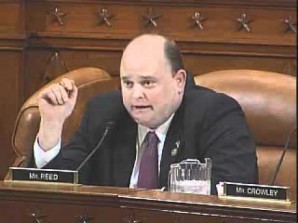

“Mr. Speaker, I have yet to receive a response from the President, not even a courtesy response so I know it was received and not lost in the mail between my office in the Longworth Building and the White House, less than 2 miles away.
So I take to the floor of the House today to have my proposal officially recorded and to lay out this framework to get our Nation on a path of fiscal sustainability, to get our American fellow citizens back to work by fixing our Tax Code, and solving the entitlement crisis that is impending upon us.
With that, I ask us to join in this proposal and ask the President to join us in a bipartisan manner to address these concerns”, said Rep. Reed.
On December 11, 2013 Rep. Tom Reed of New York asked for and was granted permission to address the United States House of Representatives for a few minutes regarding various issues.
There he also read into the Congressional Record his letter to the President of the United States, dated November 15, 2013. A letter he indicated the President hasn’t bothered to respond to:
“Dear Mr. President,
It is time. As I have expressed before in writing to you and members of your administration, I am very interested in working with you in a bipartisan manner to implement long-term solutions to America’s debt problems. Our impending debt crisis and threats to the solvency of Social Security and Medicare must be solved now before they reach catastrophic levels. I urge you to work with Congress to achieve a long-term solution. As such, I would like to take you up on your public offer to discuss ideas and implement solutions that will no longer force us to govern through crises, cliffs, or shutdown deadlines.
On October 16, 2013, you stated you are “Willing to work with anybody ….. Democrat or Republican, House or Senate Members on any idea that will grow our economy, create new jobs, strengthen the middle class, and get our fiscal house in order for the long term.” To that end, I submit the following honest proposal which I truly believe will take a small but significant step forward toward more responsible governance. Also, I hope it might change the culture of Washington, D.C., to an environment where good policy triumphs over politics.
As you can see, the honest proposal is a multistep vision and plan summarized as follows:
Step 1, raise the February 7, 2014, debt ceiling limit in an amount equal to the total CBO score of spending reductions, reforms, and removal of waste, fraud, and abuse within government operations that have already been identified and supported on a bipartisan basis. Attached, please find a list of $573 billion of such government reforms and spending reductions already identified to date.
Step 2a, upon completion of step 1, we will then move to step 2. In step 2, what we would propose is votes in the House and Senate on their respective visions for comprehensive tax reform and also for reform of our entitlement programs to ensure their solvency for another generation would occur. If those votes occur in the House and Senate, there would be automatic relief of the debt ceiling cap for an additional year.
And then we would move to step 3, Mr. President. Step 3 would essentially say, if in the House or the Senate we enact either one of those long-term solutions through our Tax Code or through our entitlement crisis with our Social Security and Medicare insolvency coming down on us, we would immediately, in step 3, relieve the debt ceiling for an additional 2-year period of time. This would mean, Mr. President, the debt ceiling restraint would no longer impact your administration as it would be automatically extended beyond the end of your administration’s term.
I kindly request you review this proposal and then meet to discuss how it can be improved and implemented. To me, this is an honest proposal which will put Americans first and begin to address the pressing issues of our day. We have major debt issues that cannot wait any longer. Our arcane Tax Code stifles economic growth, and the fiscal health of Social Security and Medicare is worsening beyond control. If we solve these two challenges, we will place our children and grandchildren and our Nation’s finances in a far better position than where they are now projected to be. To me, this adheres to a fundamental rule that we must pass America on to our next generation in a better condition than which we found her. I look forward to hearing your thoughts and working with you to prevent the dire consequences of failing to address these challenges”, said Rep. Reed (source: Congressional Record: http://thomas.loc.gov/).
Rep. Reed currently Co-Chairs the House Manufacturing Caucus and Congressional Natural Gas Caucus, and is Vice Chair of the Congressional Diabetes Caucus.
Previously, Congressman Reed served on the Rules, Judiciary, and Transportation and Infrastructure committees in the U.S. House of Representatives. He is generally well regarding by members of both political parties in Washington.
